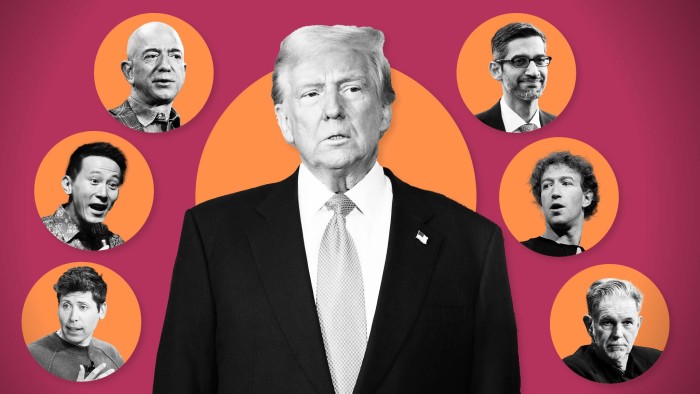Ted Sarandos, the 60-year-old chief executive of Netflix, has been a prominent Democratic donor for years.
But on Tuesday, he became the latest senior figure in corporate America to step into Donald Trump’s Mar-a-Lago resort to pay tribute to the Republican president-elect and build relations with his incoming administration.
From Hollywood to Silicon Valley and Wall Street, senior executives have been bending over backwards to meet Trump since he won the presidential election against Kamala Harris in early November.
The pace of meetings has accelerated in recent days — and has moved well beyond the world of Republican donors Trump steadily reeled in to finance his campaign.
As well as seeing Sarandos, Trump is due to meet billionaire Amazon boss Jeff Bezos on Wednesday. This follows a visit from Shou Zi Chew, the CEO of TikTok, on Monday, just hours after Trump stood beside Masayoshi Son to announce a $100bn US investment from Japan’s SoftBank.
Inside Trump’s orbit, the meetings are cast as a vote of confidence in the president-elect and his economic policies. Many in the business world had stopped engaging with Trump after his tumultuous first term and the January 6 2021 attack on the US Capitol. Some had backed Trump’s opponents in this year’s White House race.
“Some of these CEOs are showing that they will be willing partners in the upcoming administration, and saying that they want to focus on where they can work together, even if they have not been politically supportive in the past,” said Jason Miller, a senior Trump adviser. “There will be a whole bunch more coming, domestic CEOs and international CEOs.”
The executives’ motivations vary: TikTok’s Shou is looking to save the popular app from a US ban due to take effect next year and hoping to find some sympathy from Trump. Big Tech executives, including Tim Cook of Apple, Sundar Pichai of Google and Mark Zuckerberg of Meta, are seeking a more benign regulatory environment.
“It takes a lot for an uber-wealthy, creative-type CEO, many of whom lean left, to suck it up and deal with Trump,” said a Washington lobbyist. “But what choice do they have?”
Wall Street chief executives also believe Trump will reverse President Joe Biden’s policies that they perceived as anti-business, including on tax and antitrust.
Corporate America does have some serious concerns about Trump, especially his plans for sweeping tariffs, mass deportations of undocumented immigrants and the rollback of some manufacturing subsidies. But executives also see Trump as a dealmaker and learned that it is better to engage with him with exuberance and flattery than to criticise him and risk his public rebukes or retaliation.
“What I tell CEOs is that it’s good to get face time with President Trump. It’s good to let him know what you’re working on. It’s good to let him know how you’re growing business,” said Nikki Haley, who battled him for the Republican party presidential nomination but is now vice-chair of the consultancy Edelman, where she advises companies on how to deal with the president-elect. “I’m not talking to any CEOs that are fearful of Trump,” she told the Financial Times.
As well as meetings with Trump at Mar-a-Lago and new investment announcements, some executives and companies — such as Sam Altman of OpenAI and banks including Bank of America and Goldman Sachs — are expressing their support for the next president by helping to bankroll his inauguration.

Some executives think their charm offensive is working.
“We don’t really need to hire lobbyists, Trump is representing Wall Street,” said a top financier. One top adviser to several bank chief executives added: “They are all making the pilgrimage to pay their respects, either in person or virtually.”
The Washington lobbyist said corporate America saw Trump’s victory in the popular vote as confirmation of public support — giving him the kind of mandate he lacked after winning in 2016 despite trailing Hillary Clinton across the electorate.
But Trump has also cast himself as a champion of the working class, with even more populist plans than during his first term. That is another reason for corporate executives to shore up their relationship with the Republican.
“Trump is going to govern as a Main Street-type guy, not a Wall Street guy. So they better get in and explain how their respective companies are driving the economy and aren’t anti-competitive,” the lobbyist said.
Hedge fund and private equity executives are also using Scott Bessent and Howard Lutnick, Trump’s picks for treasury and commerce secretary, respectively, as a conduit to meet or talk to the president-elect. Both men have spent long careers as investors in New York.
Two people with direct knowledge of these conversations said they had been fairly light on content, although the wish list for corporate bosses was long.

Dealmakers especially hope the new president will undo anything promoted by Lina Khan, Biden’s progressive Federal Trade Commissioner chair, including removing tough new merger guidelines. They have also asked for reforms to limit reviews by Cfius — which assesses the impact of foreign investment on national security — only to transactions involving US enemies such as Russia, Iran and North Korea. This would exempt from Cfius scrutiny any proposed mergers by companies from allies such as Japan, the UK and other European countries.
Miller said the new administration would immediately begin deregulating, allow more oil and gas exploration, and cut taxes to improve the business climate — all outcomes sought by CEOs who came into Trump’s fold.
“American workers know that President Trump will stand up for their industries and protect them from foreign competitors trying to wipe out their very existence. Everybody wants to get on board.”
Additional reporting by Alex Rogers in Washington, Joshua Franklin and Stephen Gandel in New York and Christopher Grimes in Los Angeles
Read the full article here




